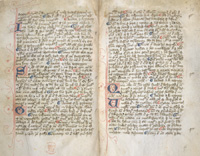 |
 |
 |
 |
 |
 |
 |
|
The Cistercian studium at Oxford (1/9) At the vanguard of change: the Cistercian studium at Rewley
In 1247 the Cistercians established a college (studium) in Paris where members of the Order could complete a university education in an appropriate environment; other orders followed suit. The foundation of this college, known as St Bernard’s, owed much to the energy and enthusiasm of an Englishman, Stephen of Lexington, who was at this time abbot of Clairvaux. With the backing of Pope Innocent IV, Stephen forged ahead to convert the Order’s house for student monks in Paris into the first Cistercian college.(2) It was almost forty years later that the first Cistercian studium was established in England. This was Rewley (Regali loci), which was founded in 1282 by Edmund, earl of Cornwall and was dependent on Thame Abbey. (3) Accordingly, the founding community at Rewley - an abbot and fourteen monks - came from Thame. As was so often the case throughout the Middle Ages, the Cistercians stood at the forefront of change, for their studium at Rewley was, in fact, the first religious house founded at Oxford to function as a college.(4) To lead did not, however, mean to succeed, and Rewley’s life as a college was relatively short-lived. Rewley faced difficulties from the outset, not least of all as it had something of a mixed identity. On the one hand it was an abbey for the monks of Rewley, who were to provide spiritual services for their founder and his family; yet, it also functioned as a residence for Cistercian monks throughout the country, who wished to study at Oxford. Not all of the Rewley monks would have been students, and the Cistercian scholars who lodged at the college were not considered monks of Rewley; indeed their own abbots were responsible for providing their living expenses. There were thus two distinct groups residing at Rewley, who may even have occupied separate parts of the precinct.(5) It was initially for each abbot to decide whether or not he wished to send any of his monks to Rewley. In England, as elsewhere, many were reluctant to so. This led to a ruling in 1292, which made it obligatory for all Cistercian abbots to send one monk for every twenty in the community to the local studium and to provide each scholar with an allowance of at least sixty shillings. Direct evidence of the rather lukewarm attitude of the English abbots survives in a letter sent by the abbot of Cîteaux to the abbots of the Southern Province (Canterbury) in 1292, which names every community in the kingdom that had so far failed to send a scholar to Oxford.(6) |
|||
|
